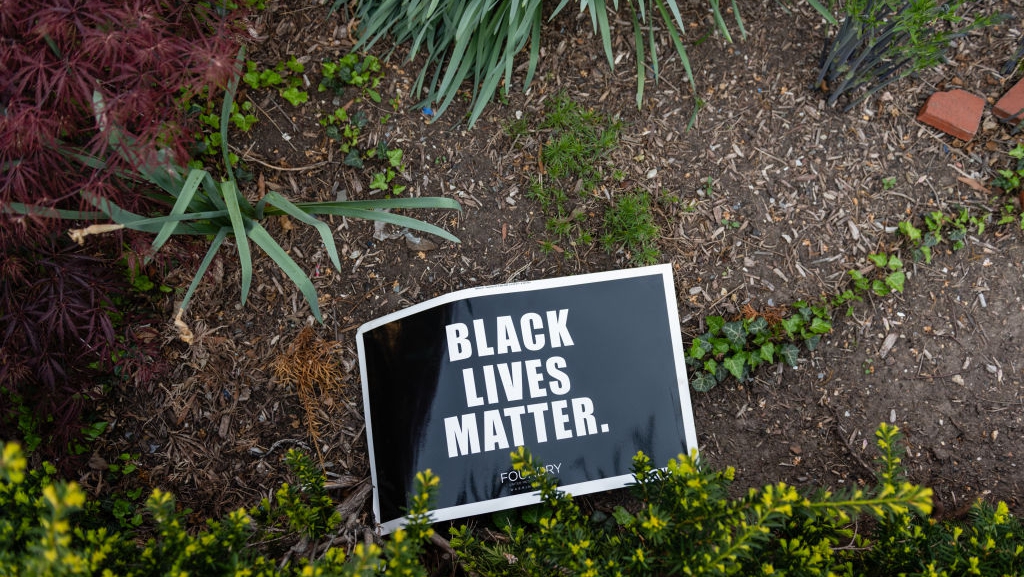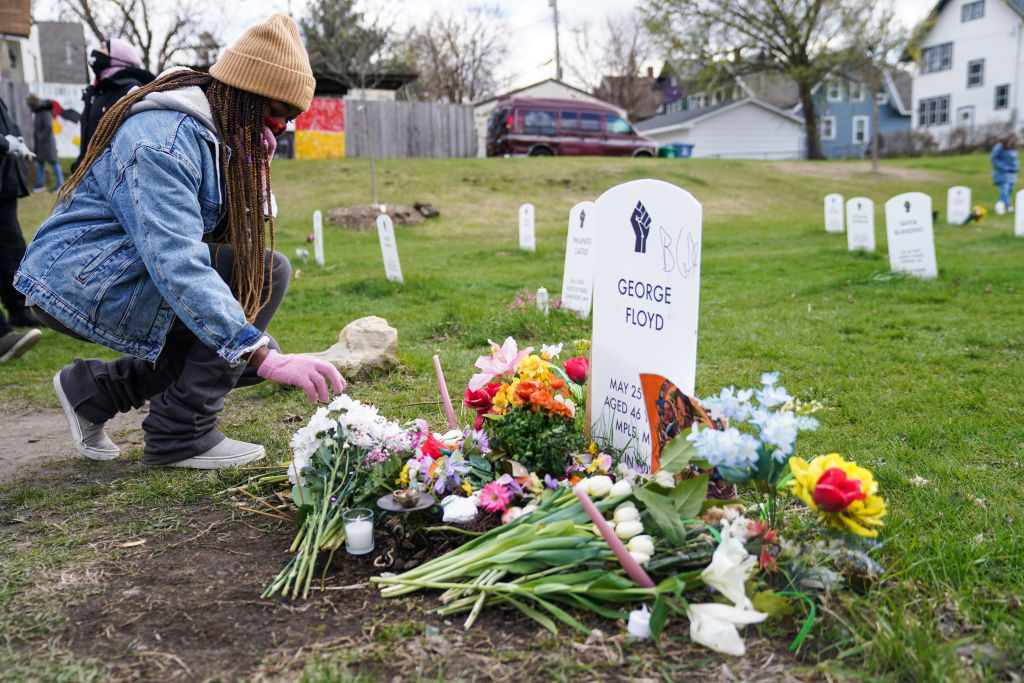
A sign reading Black Lives Matter on the ground in the bushes near Black Lives Matter Plaza in Washington, D.C., U.S., April 20, 2021. /Getty
A sign reading Black Lives Matter on the ground in the bushes near Black Lives Matter Plaza in Washington, D.C., U.S., April 20, 2021. /Getty
Editor's note: Bradley Blankenship is a Prague-based American journalist, political analyst and freelance reporter. The article reflects the author's opinions and not necessarily the views of CGTN.
The trial of Derek Chauvin, the officer that killed George Floyd, has finally drawn to a close. On Tuesday, a jury convicted Chauvin on all counts. But even though this time justice was served, the trial itself reflected the deep problems endemic to American society.
From the defense recycling traditional racist tropes to the sycophantic cop apologia of reactionaries in the media, the case and the spectacle around it was a trial against racism itself.
This was mostly because the defense used these devices to try to create enough "reasonable doubt" to help Chauvin literally get away with murder, and it was most evident when the defense closed its arguments by going over the definition of reasonable doubt, the standard the state must overcome in American criminal prosecution, rather than appealing to Chauvin's supposed innocence.
In the year since Floyd died, details about his life – which he is not able to defend himself against – emerged in the public sphere to deliberately conjure up connections to age-old racist tropes and gaslight the public into accepting his death as justifiable.
For example, Chauvin defense attorney Eric Nelson honed in on Floyd's alleged drug use and falsely suggested that his death may have been from a drug overdose – not the fact that his client had his knee on Floyd's neck for about nine and half minutes while he said, "I can't breathe."
It's true that both fentanyl and methamphetamine were detected on Floyd's autopsy, but Dr. Andrew Baker, the medical examiner that examined Floyd's body, made clear that homicide was the cause of death. Instead, Nelson was trying to play on the jury's ignorance of illicit drugs and their effects, and their negative association with race.
As Dr. Ryan Marino, an emergency physician and medical toxicologist, pointed out in an NBC piece, "Opioids like fentanyl actually prevent people from knowing they can't breathe and from feeling like they can't breathe."
The defense also said that Floyd's drug intoxication and his size made him a threat, thus justifying Chauvin's obscene use of force, which the defense also said was standard procedure – a claim flatly denied by Police Chief Medaria Arradondo. This particular defense couples the previously mentioned ignorance of illicit drugs with age-old racist tropes.
"You will see that three Minneapolis police officers could not overcome the strength of Mr. Floyd," Nelson told the jury. "Mr. Chauvin stands 5-foot-9, 140 pounds. Mr. Floyd is 6-3, weighs 223 pounds."

A woman lays flowers at a memorial for George Floyd after the verdict in the Derek Chauvin trial in Minneapolis, U.S., April 20, 2021. /Getty
A woman lays flowers at a memorial for George Floyd after the verdict in the Derek Chauvin trial in Minneapolis, U.S., April 20, 2021. /Getty
As Nathalie Baptiste, an editorial fellow at Mother Jones, wrote on April 1, "the argument the defense was making was essentially that this Black man was so large, so powerful, and so dangerous that the only thing the tiny white cop could do to stop him was to kill him."
The prosecution, however, dismissed these tropes outright. Multiple witnesses and experts shattered the defense, then the prosecution handed the baton to the jurors before justice was inevitably served. It's no exaggeration to say that this verdict could have been aimed at our entire society.
Let's not forget that during this trial, multiple police shootings took place, including the one that killed 20-year-old Daunte Wright, who was killed just 10 miles from where George Floyd was murdered and, most shockingly, another that killed 13-year-old Adam Toledo.
American society needs a reckoning on the issue of race, something which has so far not happened. Floyd received justice on Tuesday, but there are still many more people who are seeking it. The slaying of minorities by police should not be an endemic problem in this country.
Now, this is not to say that Tuesday's verdict is not a victory in some sense. It has fundamentally changed the conversation on race in this country, which is an undeniable victory for social justice activists. Moreover, Floyd's family can rest easy knowing that the system worked this time. We should all breathe a collective sigh of relief for the Floyd family.
But here's the thing: the system working as it is supposed to is not actually a complete victory, it's what should be expected, i.e. what's supposed to happen. Activists realized their power through the course of this trial and they should continue to exercise it because there's a lot of work to be done and many more victories to be had.
(If you want to contribute and have specific expertise, please contact us at opinions@cgtn.com.)

